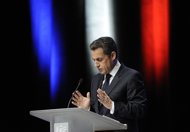Battle begins over 'refounding' of Europe
 In a landmark address in front of 5,000 supporters, Sarkozy said he would meet his German counterpart Chancellor Angela Merkel on Monday to agree upon and announce a joint plan to take to the EU summit on December 8 and 9.
In a landmark address in front of 5,000 supporters, Sarkozy said he would meet his German counterpart Chancellor Angela Merkel on Monday to agree upon and announce a joint plan to take to the EU summit on December 8 and 9.
The French leader warned the developed world was entering a "new economic cycle" dominated by debt reduction, and thus of tough times ahead.
"Europe will have to make crucial choices in the weeks to come," he warned in the southern port city of Toulon, adding: "Europe is not a choice, it is a necessity, but it needs to be rethought, refounded."
Merkel is to lay down her vision of how the EU should work, and her conditions, in a speech to the Bundestag lower house of parliament on Friday.
"France is fighting with Germany for a new treaty. More discipline, more solidarity, more responsibility ... true economic government," said Sarkozy, urging members to adopt a "Golden Rule" obliging them to balance their budgets.
The stability of the eurozone economy has been rocked by a sovereign debt crisis spreading from the eurozone's highly indebted peripheral states like Greece and Ireland towards major economies such as Spain and Italy.
European leaders have struggled to convince markets that they will be able to stave off the risk of a massive default that could bring down banks, cause a global credit crunch and bring down their single currency.
Next week's Brussels summit is now seen as key to halting the crisis.
The European Central Bank and Bank of England cooled the air after shock action by central banks to shore up the global financial system boosted markets on Wednesday.
The new ECB president Mario Draghi sent a strong message that there is no magic wand, telling the European Parliament that the central bank will not act beyond rules laid down by EU treaties and that its purchasing of devalued government bonds is "temporary and limited".
The bank "should not be asked to do things that are not within the treaty", he told the European Parliament. "It would be not legal, but also a mistake because... it would undermine the credibility in the ECB," he added.
Bank of England governor Mervyn King said that joint central bank action launched on Wednesday was merely "some temporary relief to liquidity problems" and that the underlying causes had to be "tackled directly by the governments involved".
Britain is not a member of the eurozone, but as a member of the European Union and a financial centre, is highly exposed to the eurozone debt crisis, and King said the BoE had prepared a plan in case the single currency area breaks up.
Germany strongly backs the ECB line, arguing that the first condition of a solution to the debt crisis is cast-iron federal-type corsets controlling national budgets and economic reforms to release growth.
"What we need first and foremost are automatic sanctions when (budget) stability rules are broken," said German Minister Guido Westerwelle.
France however has pushed for the ECB to act as a lender of a last resort to eurozone governments to ensure that panicky markets do not push states into into insolvency.
Sarkozy said however that while the European Central Bank "is and will remain independent" he believes it will act to counter the threat of the eurozone crisis.
"I'm convinced that faced with the risk of deflation that is threatening Europe the central bank will act," Sarkozy said, adding that it was up to the ECB to decide when and how to act.
The catastrophic risks that Europe is running were highlighted by the EU's Economy Commissioner Olli Rehn.
He declared Wednesday that monetary union "will either have to be completed through much deeper integration or we will have to accept a gradual disintegration of over half a century of European integration".
Market tension remains high, with the euro firming but European stocks slipping on Thursday after a global rally at the central bank action the day before. Wall Street was mixed in afternoon trading.
Italy, at high risk of being the next and by far the biggest eurozone domino to need a bailout, said it is at risk of entering recession.
This warning came as the new Prime Minister Mario Monti is putting together his master plan to reform the budget after consultations with EU officials, for presentation to his cabinet on Monday.
Germany and France have warned that if Italy's finances become unsustainable the eurozone will break up.
What the stars mean:
★ Poor ★ ★ Promising ★★★ Good ★★★★ Very good ★★★★★ Exceptional
Related Contents
Latest News
More News
- Russian President congratulates Vietnamese Party leader during phone talks (January 25, 2026 | 09:58)
- Worldwide congratulations underscore confidence in Vietnam’s 14th Party Congress (January 23, 2026 | 09:02)
- Political parties, organisations, int’l friends send congratulations to 14th National Party Congress (January 22, 2026 | 09:33)
- 14th National Party Congress: Japanese media highlight Vietnam’s growth targets (January 21, 2026 | 09:46)
- 14th National Party Congress: Driving force for Vietnam to continue renewal, innovation, breakthroughs (January 21, 2026 | 09:42)
- Vietnam remains spiritual support for progressive forces: Colombian party leader (January 21, 2026 | 08:00)
- Int'l media provides large coverage of 14th National Party Congress's first working day (January 20, 2026 | 09:09)
- Vietnamese firms win top honours at ASEAN Digital Awards (January 16, 2026 | 16:45)
- ASEAN Digital Ministers' Meeting opens in Hanoi (January 15, 2026 | 15:33)
- ASEAN economies move up the global chip value chain (December 09, 2025 | 13:32)

 Tag:
Tag:




















 Mobile Version
Mobile Version